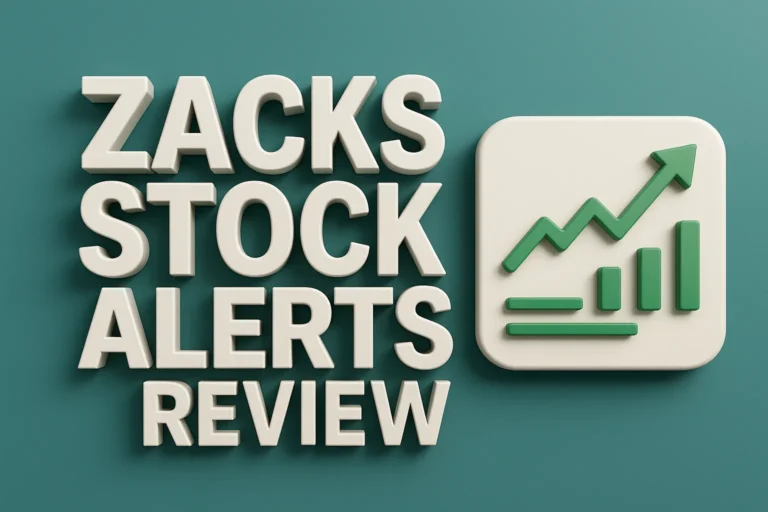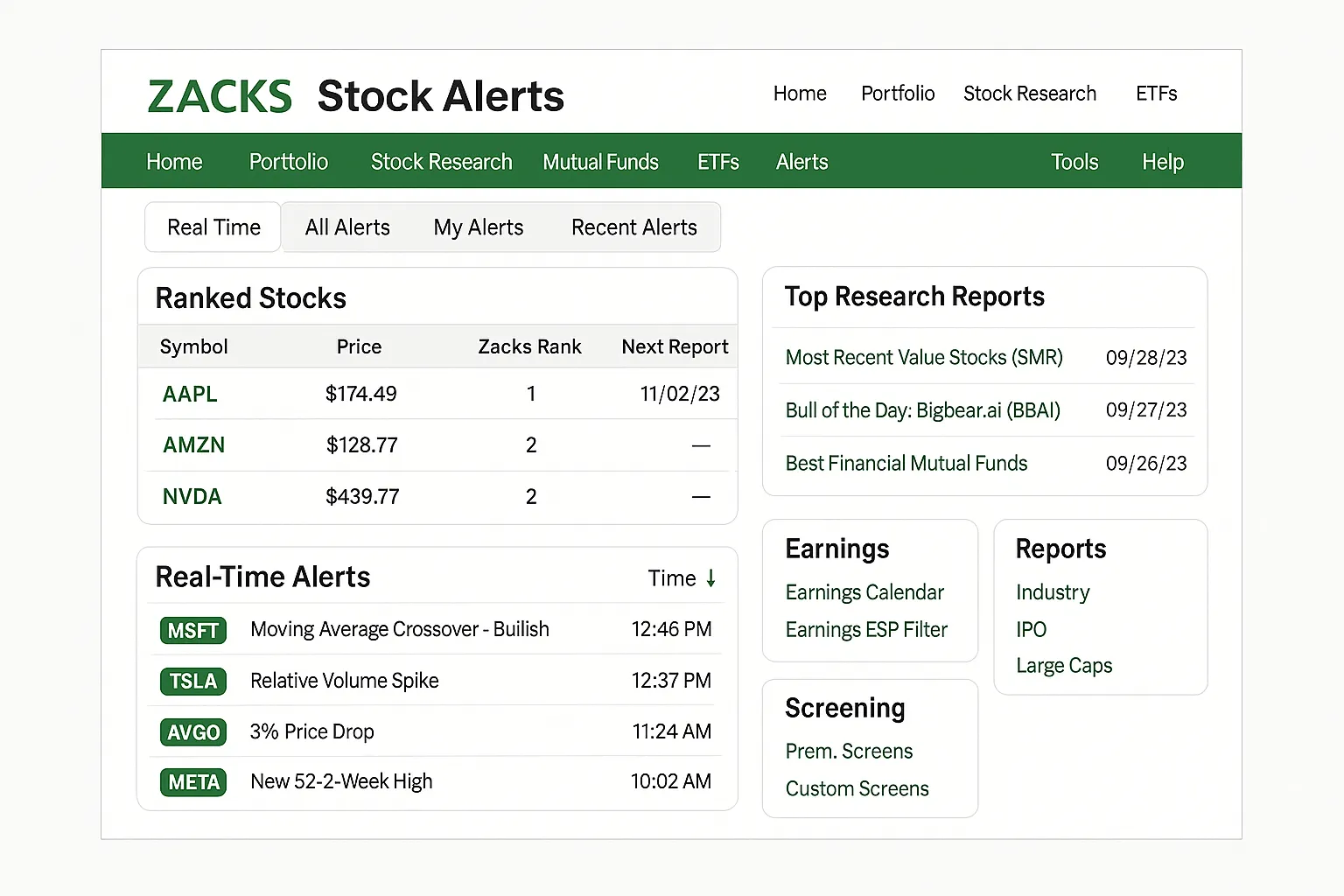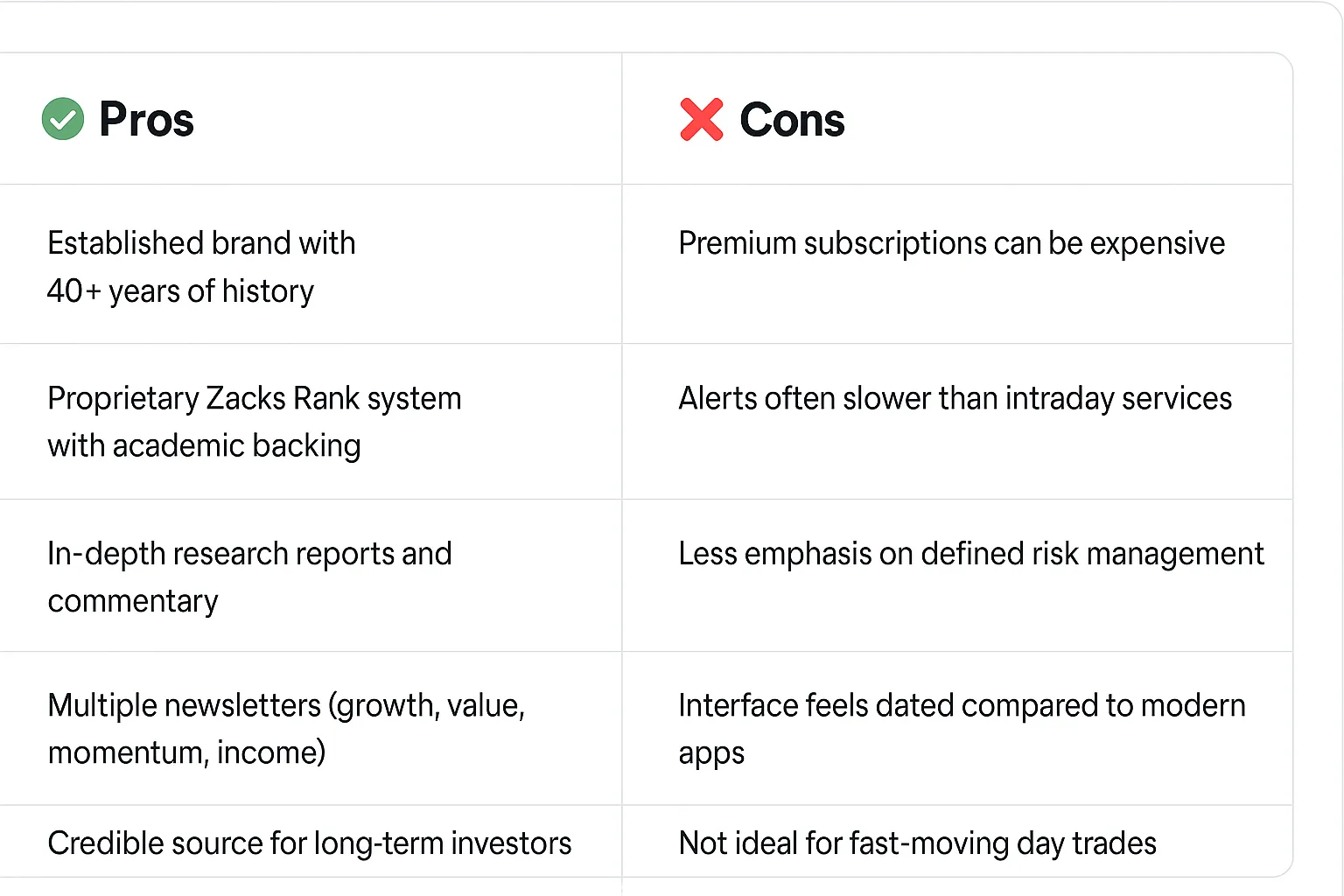
Zacks Stock Alerts Review: Is It Worth Your Money in 2025
Last updated
If you’re comparing alert services in 2025, a thorough Zacks stock alerts review is essential. Zacks is a long-standing name in equity research, but how do its alerts stack up on cost, accuracy, and ease of use—especially against nimble services like day trade alerts and swing trade alerts from TradeStockAlerts? Below, we break down features, pricing, performance data, real-user considerations, and where Zacks fits in a modern portfolio.
- What Zacks’ alert tiers include (free vs. premium)
- Pricing transparency and who each tier is best for
- Performance context vs. benchmarks and peers
- Pros & cons you should know before subscribing
- How Zacks compares to TradeStockAlerts for actionable picks
New here? Explore our cornerstone guides: penny stock alerts, daily stock picks, and stock alerts.
Quick Summary: Should you choose Zacks alerts?
Zacks offers research-driven screens and rankings that can complement disciplined investors who prefer fundamentals. However, if you need faster, trade-ready entries with tighter risk controls, compare Zacks against our day trade and swing trade alerts before deciding.
Zacks Stock Alerts Review: Overview & What You Get
Zacks Investment Research, which has been operating since 1978 and has become a household name for many investors across different levels of experience, has built its reputation largely on the strength of its proprietary Rank system, a quantitative model that screens thousands of publicly traded companies to identify those that are most likely to outperform the market based on earnings estimate revisions and other factors, and when you subscribe to their alert services—whether you choose the free tier or one of the premium plans—you are essentially buying into that long history of fundamental analysis combined with actionable recommendations, though the depth and timeliness of what you receive can vary significantly depending on which level of access you select.
Free Zacks Alerts
At the free tier, Zacks provides users with access to a daily list of stocks that hold the coveted Rank #1 (Strong Buy) rating, along with a selection of newsletters that provide market summaries and highlight sectors of interest, and while this can be an excellent introduction to the type of research Zacks is known for, it is important to understand that the free plan lacks some of the more detailed commentary and real-time responsiveness that more active traders may require, meaning that while the information is valuable from an educational standpoint, its ability to serve as a direct trading signal may be limited.
Premium Zacks Alerts
By contrast, the Premium and Ultimate tiers of Zacks alerts open the door to a much more extensive suite of features that are intended for serious investors who want to go beyond headlines, with benefits including real-time buy and sell notifications on top-ranked stocks, access to full equity research reports that delve into company fundamentals and analyst commentary, specialized newsletters that focus on specific strategies such as growth investing, income generation, and momentum trading, and even portfolio-tracking tools and advanced stock screeners, all of which combine to create a robust ecosystem for those who are willing to pay subscription fees that typically range from $249 per year for Premium up to $495 or more annually for Ultimate, though discounts and promotions are often available.
- Real-time buy and sell alerts tied directly to the Zacks Rank system
- Comprehensive equity research reports with analyst insights
- Specialized newsletters for growth, income, and momentum strategies
- Portfolio monitoring tools and customizable stock screening
When you weigh the cost of Zacks against alternative services such as swing trade alerts from TradeStockAlerts—which tend to emphasize affordability, clarity of entries and exits, and speed of delivery—it becomes clear that Zacks is positioning itself more as a research-first platform rather than as a nimble, execution-ready service.

Who Typically Uses Zacks?
Because Zacks alerts are built around a methodology that emphasizes earnings revisions, fundamental strength, and sector rotation strategies, the service tends to appeal most strongly to long-term investors and swing traders who want a research-backed confirmation of their investment theses, whereas short-term day traders who rely on split-second timing, real-time catalysts, and strict risk management parameters may find Zacks somewhat slow for their needs, making it more appropriate for those who enjoy digging into the story behind a stock rather than those who simply want a quick buy or sell signal, and in such cases a streamlined service like day trade alerts may be a better fit.
In the next section, we will take a closer look at how Zacks’ actual performance metrics compare with alternative providers, helping you understand not only what you get in theory but also what you can realistically expect in practice.
Performance & Comparison vs. Alternatives
When evaluating any stock alert service, performance is always the most critical factor to consider, because while marketing promises and carefully crafted presentations may sound impressive, the real question that matters is whether the alerts themselves have historically provided actionable, timely, and risk-adjusted opportunities that fit an investor’s actual goals and risk tolerance, and in this section we will explore how a fundamentals-driven platform like Zacks compares to services such as TradeStockAlerts, which are built around delivering trade-ready entries and exits designed for both day and swing trading environments where speed and clarity matter most.
How to Judge Any Alert Service
In order to fairly evaluate performance, investors should keep in mind a handful of essential criteria, including the overall quality of the signals (meaning whether they clearly define entry points, stop losses, and profit targets rather than vague recommendations), the timeliness of delivery (since even a strong idea loses much of its edge if delivered too late to act on), the degree of emphasis on risk management (because without disciplined stops and position sizing even profitable ideas can become dangerous), the transparency of the provider’s published track record (which should ideally include all closed trades rather than cherry-picked winners), and finally the fit between the service and your own strategy, since long-term fundamental investors have different needs than short-term momentum traders.
- Signal quality: Are entries, stops, and exits clearly defined and easy to follow?
- Timeliness: Do alerts arrive quickly enough to be actionable around news or catalysts?
- Risk management: Does the service explain stop losses and position sizing?
- Transparency: Is there a verifiable archive or just selective examples?
- Fit: Does the service match day trading, swing trading, or long-term investing?
Zacks (Fundamentals-Heavy) vs. TradeStockAlerts (Execution-Ready)
The difference between Zacks and TradeStockAlerts really comes down to philosophy: Zacks is primarily a research-first service, leaning heavily on its quantitative Rank system and fundamental analysis to identify stocks that have long-term upside potential, which makes it especially appealing to investors who want to build positions with conviction based on earnings and valuation data, while TradeStockAlerts is explicitly designed for traders who need actionable, time-sensitive alerts with precise entries, stop losses, and profit targets that can be executed in the fast-moving conditions of day and swing trading, where hesitation can mean the difference between capturing a breakout and missing the move entirely.
| Criterion | Zacks-Style Alerts | TradeStockAlerts |
|---|---|---|
| Signal Basis | Fundamental ranks, valuation research, analyst reports | Momentum, technical catalysts, price-action triggers |
| Speed/Timeliness | Slower pace, tied to research cycles | Fast delivery with intraday and swing timing |
| Risk Controls | General guidelines but limited stop-loss focus | Clear stop-loss, target, and position sizing rules |
| Best For | Long-term investors and research-driven swing traders | Active day and swing traders seeking clarity and speed |
| Transparency | Research reports and proprietary rank methodology | Archived alerts with full trade plans |
Where a Zacks Stock Alerts Review Fits Your Strategy
Ultimately, the real value of Zacks is not so much in delivering pinpoint buy and sell instructions but in providing a steady pipeline of fundamentally strong ideas that can serve as a starting point for investors who enjoy analyzing companies in depth, while TradeStockAlerts focuses on the opposite end of the spectrum by delivering immediate, actionable guidance to traders who want to capitalize on volatility without the burden of reading lengthy research reports, and the smartest approach may often be to combine both—using Zacks to source fundamentally sound opportunities and TradeStockAlerts to decide exactly when to enter or exit those opportunities with risk controls firmly in place.
Note: All investing carries risk, and past performance does not guarantee future results; always verify methodologies, review disclosures, and ensure that any service you use aligns with your financial objectives and risk tolerance.
Want Alerts Built for Execution?
If you’re ready to act on clear signals with defined entries, stops, and targets, check out our daily stock picks or dive into our specialized stock alerts services tailored for active traders.
Pros and Cons of Zacks Stock Alerts
Every service has strengths and weaknesses. A balanced Zacks stock alerts review highlights what the platform does well and where it falls short. Use this side-by-side comparison to decide whether the features align with your goals as a trader or investor in 2025.
| ✅ Pros | ❌ Cons |
|---|---|
| Established brand with 40+ years of history | Premium subscriptions can be expensive |
| Proprietary Zacks Rank system with academic backing | Alerts often slower than intraday services |
| In-depth research reports and commentary | Less emphasis on defined risk management |
| Multiple newsletters (growth, value, momentum, income) | Interface feels dated compared to modern apps |
| Credible source for long-term investors | Not ideal for fast-moving day trades |
Best Fit For
Zacks alerts are best suited for investors who value fundamental research and are willing to pay for detailed reports. If your focus is quick entries and real-time catalyst trading, services like our day trade alerts or swing trade alerts will likely be a better fit.

See current pricing and alert tiers directly on Zacks.com
Investopedia ComparisonIndependent breakdown of top stock alert services including Zacks
Coming up next: answers to the most common questions investors ask before subscribing, plus our final verdict.
FAQs & Final Verdict
Before you subscribe, here are the most common questions readers ask during their own Zacks stock alerts review. We keep answers concise and practical so you can decide quickly.
Is Zacks good for beginners?
Yes—if you want fundamentals-first ideas. Zacks’ Rank and research reports can help newer investors understand why a stock screens well. If you want faster, trade-ready entries with clear stops/targets, consider pairing Zacks with day trade alerts or swing trade alerts.
What does Zacks Premium include vs. free?
Free offers basic picks and newsletters; Premium/Ultimate add expanded screens, full reports, and more frequent alerts. Always confirm current inclusions on the official Zacks site.
How should I evaluate any published track record?
Look for methodology transparency, out-of-sample periods, and whether results include all closed ideas. You can also learn how public companies report results and disclosures via SEC EDGAR (for context on filings) and compare with independent primers like FINRA Investor Education.
Is Zacks better for long-term investing or trading?
It skews toward long-term and swing ideas because the Rank is fundamentals-driven. Active traders often prefer execution-ready plans like our stock alerts that specify entries, stops, and profit targets.
What risks should I keep in mind?
Markets can move against any thesis. Diversify, size positions modestly, and use risk controls. For broader context on risk and return, see Morningstar and CFA Institute.
How does Zacks compare with other alert brands?
Zacks focuses on fundamentals; alternatives vary from newsletter-style picks to real-time trade alerts. For a neutral overview of services, see this comparison by Investopedia, and for listing data and corporate actions browse Nasdaq Market Activity.
Final Verdict: Is Zacks Worth It in 2025?
If your priority is a research-backed pipeline of fundamentally strong ideas, a Zacks subscription can be worth it—especially for longer-term investors. If you want faster signals with precise entries, stops, and targets, complement your Zacks stock alerts review with our execution-focused day trade alerts and swing trade alerts. Many readers use Zacks for idea generation and TradeStockAlerts for timing and risk management.
Get Trade-Ready Alerts Today
Access clear entries, stops, and targets—built for today’s volatility. Start with our daily stock picks or jump straight into stock alerts.